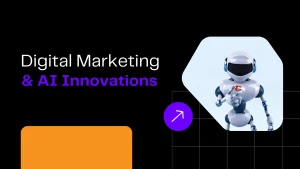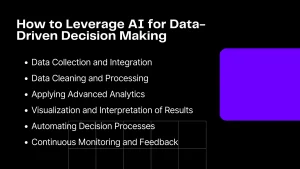Harnessing Digital Marketing and AI Innovations for Today’s Business Growth

Artificial intelligence is leading the quick changes in the world of digital marketing. AI is changing the game with individualized customer experiences and efficient marketing. Integrating digital marketing and AI-driven solutions is not optional for companies hoping to flourish in this fast-changing world; it is rather necessary.
This blog will discuss how AI is changing digital marketing, present examples, and offer actionable insights to help business owners like you succeed.
Personalization at Scale: How AI Creates Hyper-Relevant Experiences
AI-Powered Customer Segmentation
Broad marketing initiatives that stereotypically group clients are gone. AI helps companies to divide their audience into precise categories depending on behavior, preferences, demographics, and more. Machine learning tools like Salesforce Einstein and Segment analyze customer data sets to find trends that marketers may miss.
Predictive Analytics for Tailored Recommendations
Predictive analytics anticipates consumer requirements before they express them, elevating personalizing. Amazon and Netflix use AI to propose products and shows, making customers feel “understood” by the brand. By offering customized content and recommendations across websites and email marketing campaigns, systems like Dynamic Yield can help smaller companies achieve comparable results.
Case Studies in AI Personalization
Sephora and Spotify successfully use digital marketing and AI-driven customization. With Sephora’s AI-powered Virtual Artist app, clients may experiment virtually with cosmetics and get well-chosen recommendations. Spotify’s AI-crafted Discover Weekly playlists have become a trademark of music personalization, increasing customer loyalty and engagement.
AI Digital Marketing Tools
Nowadays, several AI-powered tools are available to improve digital marketing campaigns and provide adapted consumer experiences.
- Drift and Intercom: Support customers in real time using chatbots and user insights.
- Copy.ai and Jasper: Create excellent, engaging content catered especially for particular groups.
- Google Analytics 4 and Domo: AI can evaluate customer data and provide data-driven insights.
These instruments enable companies to simplify processes, boost effectiveness, and establish close relationships with their clients.
Utilizing AI and Digital Marketing: Best Practices
Automation and Efficiency: Streamlining Campaign Management
AI-Driven Ad Optimization
Google Ads and AdRoll use AI to find the best keyword bids and audience groups. By concentrating budgets on the most successful advertising, marketers not only save many hours but also raise return on investment.
Chatbots and AI-Driven Customer Service
Drift and Intercom are changing customer service with 24/7 chatbots. Among the many chores, these bots can answer questions, schedule appointments, or even direct consumers through purchase decisions. Meanwhile, customer service staff might focus on more complicated issues.

Voice and Visual Search: The Next Frontier of SEO
AI’s Role in Search Engine Optimization
Google’s RankBrain and Baidu’s AI search algorithms are changing SEO. These systems give natural language searches and contextual relevancy top priority, which drives marketers to go beyond conventional keyword stuffing.
The Rise of Voice Search
Voice search is changing digital marketing with Amazon Echo and Google Home rising in popularity. Companies must maximize for conversational questions by including more natural language in the content to match people’s speech patterns.
Preparing for Visual Search
Users may now search using photos instead of keywords using AI-powered tools like Pinterest Lens. Visual search is powerful for discovery because it identifies items in images and links people to relevant resources.
AI-Powered Content Creation: The Future of Copy and Visuals
AI and digital marketing solutions like Copy.ai and Jasper are transforming how businesses produce written materials. Advanced algorithms on these platforms help create high-quality blogs, social media posts, and ad copies in minutes, speeding up content development. These systems generate clean and professional language, but human creativity is needed to guarantee that content resonates emotionally with the target audience and matches the brand’s tone and messaging. Marketers can get significant outcomes by combining human understanding with artificial intelligence efficiency.
Advanced Visual and Video Creation
Marketers are using AI-powered Canva and Runway ML to generate images and videos. With tools and templates that let anyone, regardless of design experience, Canva streamlines the production of professional-grade graphics. Runway ML uses machine learning to automate picture upgrades, background removal, and professional animations. Without a full design team or costly software, these solutions enable marketers to create amazing, captivating content that grabs the audience’s attention.
Navigating Ethics and Authenticity
AI-generated content presents plagiarism and brand legitimacy concerns despite its benefits. Finding a mix between automation and human guidance guarantees that your brand voice stays real and trustworthy.

Data-Driven Decision-Making: Combining Digital Marketing and AI
Brands should focus on these areas to use AI for data-driven decision-making:
Data Collection and Integration
First, businesses must have excellent data collection systems for consumer transactions, social media, website analytics, and IoT devices. Advanced AI platforms may include data from numerous channels to eliminate silos and unify operations. Integration tools like Apache Kafka and AWS Glue enable timely and trustworthy data inputs.
Data Cleaning and Processing
Inconsistencies, duplication, and missing numbers plague raw data. Data pretreatment AI marketing tools like SAS Data Preparation and Talend can clean, normalize, and structure information for data analysis. This phase is crucial for AI model findings to be accurate and relevant. Businesses should also audit and maintain data quality.
Applying Advanced Analytics and Machine Learning Models
Machine learning algorithms may find trends, patterns, and anomalies in information to provide useful insights. Businesses may use predictive analytics, classification systems, and clustering algorithms with TensorFlow, PyTorch, and Azure Machine Learning. Predictive models help companies accurately estimate demand, assess risks, and identify market possibilities, making AI and digital marketing analytics an effective combination for business.
Visualization and Interpretation of Results
AI is most beneficial when its outputs are clear. Tableau, Power BI, and Looker excel in visualizing AI-driven insights into charts, graphs, and dashboards. These tools let stakeholders quickly understand complicated datasets and make product innovation, customer segmentation, and operational efficiency decisions.
Automating Decision Processes
In addition to insights, AI may automate decision-making activities. AI tools combined with process automation platforms like UiPath or IBM Watson can streamline repetitive activities and automate specified decisions.
Continuous Monitoring and Feedback
It takes time to make data-driven decisions. Real-time analytics-powered AI solutions let organizations respond swiftly. Using KPIs and automatic feedback loops, decision-makers may dynamically adjust their plans to stay ahead. Monitoring technologies like Splunk or Google Cloud are useful here.
AI in Social Media: Enhancing Engagement and Reach
AI techniques have transformed social media marketing by increasing engagement and reach. With the ability to analyze massive amounts of data, AI-driven systems help marketers understand consumer behavior and preferences. Content scheduling, trend analysis, and social listening may be automated, freeing up marketers to focus on strategy and creativity.
Businesses can beat the competition by using digital marketing and AI tools to create engaging campaigns that save time and money.
Advantages and Challenges of AI in Digital Marketing
Artificial intelligence has changed digital marketing, presenting both opportunities and challenges.
Benefits of AI Tools
- Facilitates content, ad, and customer segmentation.
- AI-powered tools save time and money.
- Consumer behavior and trends can be anticipated using predictive analytics for proactive decisions.
- Increases efficiency by automating routine tasks.
- Allows marketers to concentrate on strategy and creativity.
Brands may make proactive decisions by using predictive analytics to anticipate consumer behavior and trends.
Disadvantages of AI in Digital Marketing Strategy
Although beneficial, AI has downsides. Marketing may lose its human touch if technology makes encounters impersonal. AI technology is expensive, which hinders smaller businesses. Also difficult are ethical issues like data privacy and customer data misuse.
Conclusion: Take the Leap Into AI-Driven Marketing
Artificial intelligence is altering marketing now and transforming how companies interact with their customers. Imagine using AI to personalize experiences or create dynamic content that resonates with each user. Social media campaigns get smarter with artificial intelligence since data-driven insights constantly refine tactics. It allows marketers to immediately process and analyze massive databases to discover trends and act precisely. Artificial intelligence gives companies in a congested industry the opportunity to innovate boldly, scale effortlessly, and create enduring relationships that propel actual expansion.
For companies ready to investigate the transforming potential of artificial intelligence, working with professionals can make all the difference. Webugol’s team integrates digital marketing and AI to help your company lead the competition. Contact us today to learn how we can help your business succeed.


